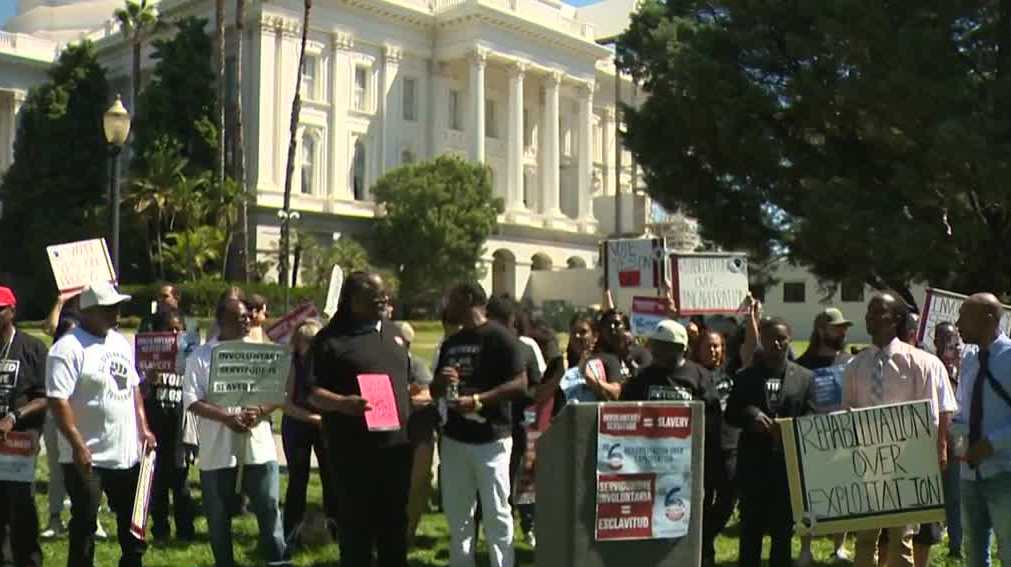
Three days after California’s Legislative Black Caucus blocked the California Assembly from voting on two reparations proposals, the leader of the state’s Reparations Task Force is speaking out against the group’s actions. “I think what happened on Saturday was unconscionable,” said Kamilah Moore, the chair of California’s Reparations Task Force, which spent two years studying the impacts of slavery and racial discrimination on African Americans in California. KCRA 3 also reached out to California Secretary of State Shirley Weber, who wrote the state law that created the task force. She declined to do an interview on the situation Tuesday. The Black Caucus announced on the final night of the legislative session on Saturday that it would not bring the two reparations proposals up for final votes in the Assembly, including SB 1403 to establish a reparations state agency and SB 1331 to establish a reparations fund. Tension among members of the caucus flared into late Saturday night, with the caucus divided over the last-minute decision. Democratic State Senator Steven Bradford, who wrote the bills, claimed the caucus was scared of Gov. Gavin Newsom’s veto after Bradford refused to accept changes to SB 1403 proposed by the governor’s office. Caucus leader, Democratic Assemblymember Lori Wilson, denied this and claimed the bills didn’t have the votes. Republican Assemblyman Bill Essayli attempted to force a vote on one of the measures. This sent Democrats scrambling to figure out how to prevent a floor vote. The Assembly then placed the bills on its inactive file, effectively killing the proposals, without Bradford’s permission. “What we saw was a complete betrayal by the California Legislative Black caucus against their own constituents,” Moore told KCRA 3 in an interview on Tuesday. “They chose to prioritize their own ego and their own self-interest over the people they claim to serve.” She noted the bill to establish the state agency, which would be known as the California American Freedman Affairs Agency, was meant to be the foundation of the state’s reparations efforts moving forward. She noted in other reparations efforts across the country and internationally, infrastructure was first put in place to set up to provide the restitution, material benefits, policies and programs. Lawmakers did send Gov. Gavin Newsom SB 1050, a reparations task force recommendation that would provide a process for those who had their land unfairly taken through eminent domain. “That land restitution is supposed to go through that agency that the CLBC members just killed,” she said. Moore was at the Capitol with several other advocates for reparations who protested the decision by the caucus. “I was really trying to plead, trying to use logic and reason to get through to these Black Caucus members to do the right thing,” Moore said. “They were just completely disrespectful to their constituents.” Moore mentioned a video that went viral showing Assemblyman Reggie Jones-Sawyer taunting the demonstrators who waited outside of the Assembly chamber. She said Assemblymembers Chris Holden, Mike Gipson and Akilah Weber walked away from those who were there urging them to bring the bills up for votes. Akilah is Secretary of State Shirley Weber’s daughter. Wilson was expected to headline a reparations-related rally at the state capitol on Tuesday but canceled. Her spokesman told KCRA she did not attend because she did not want to detract from the rally as emotions were still high from Saturday and because of safety concerns after she was doxxed online. When asked if Democratic legislative leadership should have been more involved, Moore said, “I do think Assembly leadership, namely Assembly Speaker Robert Rivas should have intervened.” “Demonstrators, supporters and advocates emailed the Speaker’s office, tagged his social media, and asked him to override the black caucus’ dysfunctionality and do right by the people of California,” Moore said. “In effect, he sided with the Black Caucus.” When asked about the proposals on Saturday night, Rivas referred reporters to the Black Caucus. “We knew this was a tough year for our budget,” Rivas said. “Everything we did was underpinned by our budget; a lot of good bills didn’t make it through.” The Legislature and governor agreed to set aside $12 million in this year’s state budget for reparations-related efforts. It’s not clear how exactly the money will be used. Moore said moving forward, she and advocates will follow that money, and try to hold the caucus accountable. See more coverage of top California stories here | Download our app | Subscribe to our morning newsletter
Three days after California’s Legislative Black Caucus blocked the California Assembly from voting on two reparations proposals, the leader of the state’s Reparations Task Force is speaking out against the group’s actions.
“I think what happened on Saturday was unconscionable,” said Kamilah Moore, the chair of California’s Reparations Task Force, which spent two years studying the impacts of slavery and racial discrimination on African Americans in California.
Advertisement
KCRA 3 also reached out to California Secretary of State Shirley Weber, who wrote the state law that created the task force. She declined to do an interview on the situation Tuesday.
The Black Caucus announced on the final night of the legislative session on Saturday that it would not bring the two reparations proposals up for final votes in the Assembly, including SB 1403 to establish a reparations state agency and SB 1331 to establish a reparations fund.
Tension among members of the caucus flared into late Saturday night, with the caucus divided over the last-minute decision. Democratic State Senator Steven Bradford, who wrote the bills, claimed the caucus was scared of Gov. Gavin Newsom’s veto after Bradford refused to accept changes to SB 1403 proposed by the governor’s office. Caucus leader, Democratic Assemblymember Lori Wilson, denied this and claimed the bills didn’t have the votes.
Republican Assemblyman Bill Essayli attempted to force a vote on one of the measures. This sent Democrats scrambling to figure out how to prevent a floor vote. The Assembly then placed the bills on its inactive file, effectively killing the proposals, without Bradford’s permission.
“What we saw was a complete betrayal by the California Legislative Black caucus against their own constituents,” Moore told KCRA 3 in an interview on Tuesday. “They chose to prioritize their own ego and their own self-interest over the people they claim to serve.”
She noted the bill to establish the state agency, which would be known as the California American Freedman Affairs Agency, was meant to be the foundation of the state’s reparations efforts moving forward. She noted in other reparations efforts across the country and internationally, infrastructure was first put in place to set up to provide the restitution, material benefits, policies and programs.
Lawmakers did send Gov. Gavin Newsom SB 1050, a reparations task force recommendation that would provide a process for those who had their land unfairly taken through eminent domain.
“That land restitution is supposed to go through that agency that the CLBC members just killed,” she said.
Moore was at the Capitol with several other advocates for reparations who protested the decision by the caucus.
“I was really trying to plead, trying to use logic and reason to get through to these Black Caucus members to do the right thing,” Moore said. “They were just completely disrespectful to their constituents.”
Moore mentioned a video that went viral showing Assemblyman Reggie Jones-Sawyer taunting the demonstrators who waited outside of the Assembly chamber. She said Assemblymembers Chris Holden, Mike Gipson and Akilah Weber walked away from those who were there urging them to bring the bills up for votes.
Akilah is Secretary of State Shirley Weber’s daughter.
Wilson was expected to headline a reparations-related rally at the state capitol on Tuesday but canceled. Her spokesman told KCRA she did not attend because she did not want to detract from the rally as emotions were still high from Saturday and because of safety concerns after she was doxxed online.
When asked if Democratic legislative leadership should have been more involved, Moore said, “I do think Assembly leadership, namely Assembly Speaker Robert Rivas should have intervened.”
“Demonstrators, supporters and advocates emailed the Speaker’s office, tagged his social media, and asked him to override the black caucus’ dysfunctionality and do right by the people of California,” Moore said. “In effect, he sided with the Black Caucus.”
When asked about the proposals on Saturday night, Rivas referred reporters to the Black Caucus.
“We knew this was a tough year for our budget,” Rivas said. “Everything we did was underpinned by our budget; a lot of good bills didn’t make it through.”
The Legislature and governor agreed to set aside $12 million in this year’s state budget for reparations-related efforts. It’s not clear how exactly the money will be used.
Moore said moving forward, she and advocates will follow that money, and try to hold the caucus accountable.
See more coverage of top California stories here | Download our app | Subscribe to our morning newsletter


